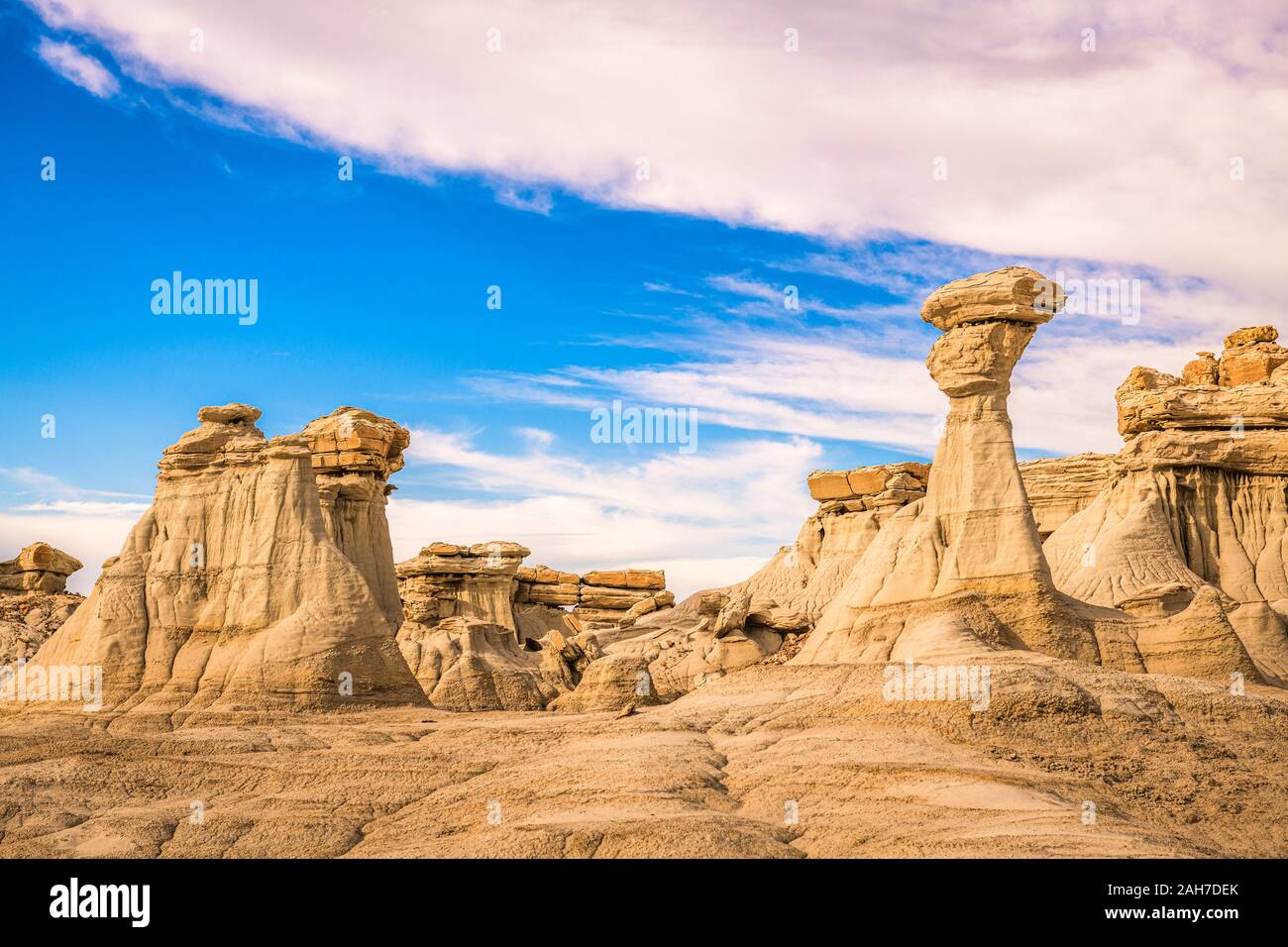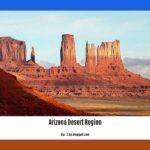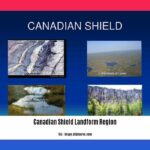Journey Through Time: Exploring the Mesmerizing Hoodoos of White Valley, New Mexico
Welcome to White Valley, New Mexico, where the earth whispers tales of a time long past. Here, amidst the rugged beauty of the Tularosa Basin, you’ll encounter enchanting sandstone formations known as hoodoos, standing tall like silent guardians of the desert. This comprehensive guide will take you on a journey through the geological marvels of White Valley, revealing the secrets of these captivating natural wonders and offering tips for experiencing their magic firsthand.
What Are Hoodoos, and How Did They Form?
Imagine towering pillars of rock, sculpted over millions of years by the tireless forces of wind and water. These are hoodoos, and they’re found in arid regions around the world, each with its unique charm. Scientists believe they likely formed from layers of sediment deposited over millions of years when the area was submerged beneath an ancient inland sea. As the water receded, these layers were compressed into rock, but nature wasn’t finished yet!
Wind and rain, like patient artists, began to erode the softer rock layers, leaving behind the more resistant materials that form the stunning hoodoos we see today. Their varied shapes, often resembling mushrooms, fairy chimneys, or even otherworldly creatures, are a testament to the power of erosion and the passage of time.
White Valley: A Hidden Gem in the Tularosa Basin
White Valley, tucked away in the Tularosa Basin of southern New Mexico, is home to a particularly captivating collection of hoodoos. Unlike its more famous neighbor, the Ah-Shi-Sle-Pah Wilderness Study Area (located in the San Juan Basin), White Valley remains relatively unknown, offering a sense of secluded wonder. It’s a place where you can wander among these geological marvels and truly connect with the raw beauty of the natural world.
Here’s what sets White Valley’s hoodoos apart:
- Unique Location: The Tularosa Basin’s specific geological history and arid climate have contributed to the distinctive shapes and colors of the hoodoos found here.
- Towering Spires: White Valley’s hoodoos are often characterized by their tall, slender forms, creating a sense of grandeur as they rise from the desert floor.
- Mushroom-like Caps: Many of the hoodoos here sport whimsical mushroom-shaped tops, a result of the differential erosion patterns of the sandstone layers.
Experiencing the Magic of White Valley
A journey to White Valley is more than just a sightseeing trip; it’s a chance to step back in time and witness the artistry of nature firsthand. Here are some tips for planning your adventure:
- Accessibility: While White Valley is a remote location, it is accessible by car, though a four-wheel-drive vehicle is recommended for navigating the unpaved roads.
- Photography: The hoodoos of White Valley, with their striking shapes and colors, offer endless photographic opportunities. Arrive early in the morning or late in the afternoon for the best lighting.
- Leave No Trace: Remember, you are a visitor in a fragile ecosystem. Pack out everything you pack in, stay on designated trails, and resist the urge to disturb the natural formations.
Beyond the Hoodoos: Discovering the Richness of White Valley
While the hoodoos are undoubtedly the stars of White Valley, the surrounding landscape is full of hidden treasures waiting to be discovered:
- Petrified Wood: Keep an eye out for fossilized remnants of ancient forests, hinting at a time when the area was much different than it is today.
- Desert Wildlife: Despite the harsh conditions, White Valley teems with life. Look out for lizards darting among the rocks, birds soaring overhead, and perhaps even a desert fox or coyote.
- Night Skies: The remote location and lack of light pollution make White Valley an ideal spot for stargazing.
A Journey Through Time:
Millions of years in the making, the hoodoos of White Valley are a testament to the power of nature and the constant dance between creation and erosion. As you stand among these towering formations, remember that you are witnessing a geological masterpiece, a story etched in stone that continues to unfold with each passing day.
Remember to:
- Respect the power of the desert environment. Bring plenty of water, wear appropriate clothing and footwear, and be aware of changing weather conditions.
By immersing yourself in the wonders of White Valley, you’ll leave with a newfound appreciation for the beauty and fragility of our planet and the incredible forces that have shaped it over eons.
Where are the hoodoos in the White Valley of New Mexico?
It’s easy to get names mixed up, especially when dealing with locations as unique and awe-inspiring as the hoodoos of New Mexico. While White Valley is often described as being home to spectacular hoodoos, it’s not a separate entity like the Ah-Shi-Sle-Pah Wilderness Study Area. This can lead to some confusion.
To be precise, when people talk about the “White Valley” and its hoodoos, they are typically referring to a specific area within the broader Ah-Shi-Sle-Pah Wilderness Study Area, located in the San Juan Basin of northwestern New Mexico, not the Tularosa Basin. Think of it this way: the captivating hoodoo formations that characterize the “White Valley” are just one of the many stunning features found within Ah-Shi-Sle-Pah.
This area, characterized by its vibrant badlands, rolling hills, and otherworldly spires, is a photographer’s paradise and a haven for those seeking solitude in nature’s grandeur.
Here’s a breakdown to add clarity:
- White Valley is a general term describing a scenic area within the Ah-Shi-Sle-Pah Wilderness Study Area known for its striking hoodoo formations.
- Ah-Shi-Sle-Pah Wilderness Study Area is the official name of the protected area managed by the Bureau of Land Management where the “White Valley” is located.
- Location: Northwestern New Mexico, San Juan County (not the Tularosa Basin).
Decoding “Broyac G Yaleleho Hoodoos” & Outshining Competitors
The term “Broyac G Yaleleho Hoodoos” doesn’t correspond to any officially recognized place or specific hoodoo formations. It’s likely that this term has been mistakenly used online, perhaps due to the visual similarity of hoodoo formations found in different areas.
However, this presents a unique opportunity! Your content can stand out by addressing this common confusion and directing readers to the correct and equally impressive location–the Ah-Shi-Sle-Pah Wilderness Study Area.
By clarifying this misidentification, your article will gain credibility and provide valuable information that other sources may lack.
Where is the White Valley of New Mexico?
Let’s clear up the confusion surrounding the location of the “White Valley” and its captivating hoodoos:
- White Valley is not a standalone park or designated area. It is a descriptive term often used for a specific region within the Ah-Shi-Sle-Pah Wilderness Study Area.
- Ah-Shi-Sle-Pah Wilderness Study Area is located in San Juan County, northwestern New Mexico. This is important to emphasize, as it’s often mistakenly associated with other locations due to the striking similarity of hoodoo formations found in different areas.
To reach the “White Valley” and witness its impressive hoodoos:
- Head to the Ah-Shi-Sle-Pah Wilderness Study Area in northwestern New Mexico.
- Be prepared for a remote adventure. The area is known for its rugged terrain and limited amenities.
- Research and plan your route carefully, as navigating the area requires a high-clearance vehicle and a sense of adventure.
Remember: The beauty of the “White Valley” and its surrounding landscapes lies in their untouched, wild nature. By being informed and prepared, you can experience this unique destination responsibly and contribute to its preservation for future generations.
If you are a wine enthusiast looking for a unique and flavorful experience, wine from Ikaria, Greece is a must-try.
There are many tour packages available to experience the Yellowknife Northern Lights. Book now and secure your spot!
- Unlock Water’s Symbolism: A Cross-Cultural Exploration - April 20, 2025
- Identify Black and White Snakes: Venomous or Harmless? - April 20, 2025
- Unlocking Potential: Origins High School’s NYC Story - April 20, 2025
















1 thought on “The Ultimate Guide to White Valley, New Mexico: Exploring the Enchanting Hoodoos”
Comments are closed.